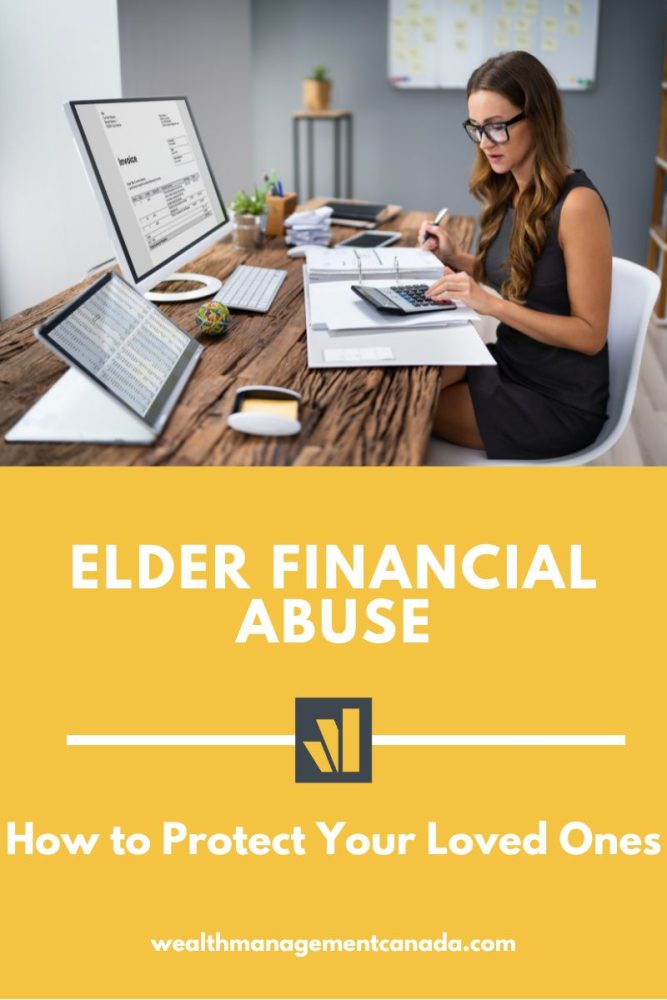Elder abuse is a nasty practice that affects over 200,000 Ontarians over the age of 65. It affects many other Canadians across the nation as well. Common types include physical abuse like pinching or neglect, like withholding food, water, or hygiene products. But, the most common and particularly exploitative type of elder abuse is elder financial abuse.

Table of contents
- What is elder financial abuse?
- Download Your Free Guide
Does your elderly loved one all of a sudden have unexplained charges on their credit card? Or do you suspect a family member or care worker is coercing them to give them financial control? You might even think ahead to protect yourself from elder financial abuse should you become less capable of managing your finances as you age. In that case, consulting a wealth manager can help. In the meantime, we’ll walk you through the ins and outs of elder financial abuse, common signs, and ways to address it. Plus, why wealth management services can help you prevent it.

START WORKING WITH A WEALTH MANAGER NOW
Related Reading: ESG and Risk Management
What is elder financial abuse?
Elder financial abuse occurs when someone in an elderly person’s life takes or uses their money or property through pressure, coercion, threats, or deception. Unfortunately, this can even occur within families, neighbours, or a power of attorney relationship. This is because elder financial abuse is most commonly practiced by people with close connections to the elderly person in question. And it’s that close connection that an abuser will exploit to financially abuse someone.
Elder financial abuse is a wide spectrum. It can include small requests for money over time that become more aggressive, to full-on fraud. An abuser might forge the elderly person’s signature, take money from their wallet, coerce a change in legal documents or wills, or stay in their home beyond their welcome.
The most heartbreaking part of it all? Elder financial abuse officially makes up 62.5% of all elder abuse cases, yet it’s not often reported. This leads experts to believe that the numbers are actually much higher. People who experience elder financial abuse might not want to upset or betray the close relationship they have with their abuser, who they may rely on in many ways. Similarly, the stigma might make them feel embarrassed, ashamed, or uninformed about how to address the issue. In some cases, the person being abused might not even notice the abuse taking place. Be it through general unawareness or a health challenge that compromises their ability to notice or act.
So, how do you spot elder financial abuse?
Common signs of elder financial abuse
If you experience or notice an elderly person experiencing these signs, they might indicate elder financial abuse:
- Unauthorized credit card transactions
- Missing jewellery, cash, legal documents like wills or deeds, bank statements, or other valuables
- Bills in collections, eviction notices, or other unpaid bills
- Mood swings, anxiety, and depression
- Behavioural changes around a close friend or family member (the abuser)
- Apprehension to discuss finances
It’s also important to note that elder financial abuse could be paired with other forms of abuse like physical abuse or neglect. For example, someone abusing an elderly person’s finances could also cause them to have limited funds for food or hygienic products. Similarly, abusers could use emotional or physical force to gain control over one’s finances.

START WORKING WITH A WEALTH MANAGER NOW
What is an example of financial abuse in adults?
Elder financial abuse can look like many different situations. Here are a couple of scenarios that all constitute financial abuse:
Sherry helps her 80-year-old neighbour Dan by picking up groceries for him biweekly. He pays her a fee to do this, as his mobility issues limit his ability to go to stores for the things he needs. She also calls him every week to ask for financial support for her personal expenses. If he doesn’t pick up the phone, she lets herself into his apartment since she has the key for the grocery runs. He obliges to her financial requests out of fear of her emotional and physical outbursts when he refuses. As well as the fear of losing out on her grocery pickup services.
Sarah is appointed power of attorney for her 85-year-old father, John. He is losing much of his memory to Alzheimer’s disease. Furthermore, he wants to ensure his estate is dispersed in the way he sees fit before he becomes too sick. Sarah convinces John to sign legal documents changing his will so that she receives more of his estate than he originally chose for her. He doesn’t remember writing his will a couple of years ago. Nor does he remember the amounts originally allocated to each of his children.
Related Reading: Asset Management vs Wealth Management
Is elder financial abuse a crime in Canada?
Elder financial abuse doesn’t have a dedicated section in Canada’s criminal code. However, the actions carried out by someone financially abusing an elderly person often correspond to other criminal acts like:
- Theft
- Fraud & undue influence
- Assault
- Intimidation or coercion
- Extortion
- Home invasion
Canada has seen multiple and varied cases of elder abuse, including elder financial abuse. Here are a couple of examples of both criminal and civil situations and the ways the courts responded based on the abuser’s history and the extent of the abuse:
- Sabol (trustee of) v Rousseau: Mary Sabol and the trustee representing her sought to reclaim $320,750 from her sister, brother-in-law, and nephew. The defendants breached trust and fiduciary obligation to steal Sabol’s funds, which included “gifting” her house to them. While the defendants argued the funds were payment for taking care of Sabol, the courts found the payment disproportionate to the care provided. Additionally, the courts found that Sabol wasn’t in sound mind when the financial transactions took place. It was ordered that the defendants return the funds.
- R v. Watson: This criminal case involved Hilda Marie Watson. She was a woman convicted of stealing over $5,000 from her cognitively impaired brother Ernest Leo Clark. She alleged that his bank account funds were her personal slush fund. He wanted her to have all of it. In the end, she was sentenced to ten months of house arrest and one year of probation.
Bottom line? The stats and subsequent criminal and civil cases show that elder financial abuse is pretty common. But how do you avoid it?
How to Prevent Elder Financial Abuse
Whether you’re thinking of your own financial health down the line or want to protect an elderly loved one, a little planning goes a long way to prevent elder financial abuse. Here’s a quick checklist to discuss with your wealth manager, lawyer, financial advisor, or trusted loved one to prevent elder financial abuse:
- Automate payments, deposits, and investments: Some elderly folks might become overwhelmed with paper invoices and investment schedules as they age. Automating payments and investments can keep their financial affairs more organized and less likely to be interrupted by an abuser. For example, there’s no reason for your daughter to “need money to pay your internet bill” if you’ve already automated that payment. Similarly, nobody needs to cash your pension cheque if you’ve already arranged for direct deposit.
- Avoid isolation and keep close ties with family and friends: This is a shared effort between elderly people and their loved ones. Make sure to keep in touch, even if just by phone. An isolated elderly person is more likely to fall victim to fraud or intimidation by an abuser.
- Limit cash at home: While some abusers have been known to steal money from banks via coerced signatures, having less cash at home still adds an extra layer between your money and an abuser.
- Establish a trust fund: A trust fund protects your money until the provisions you’ve established allow for those funds to be transferred to a beneficiary of your choice. These aren’t easy investment vehicles for an abuser to override.
- Review your will with a lawyer: Don’t just forget about your will after you write it. Take time to review it each year either with a loved one, or if you want to be extra cautious, a lawyer, to ensure your needs are best reflected in the latest version. This can also help you catch any attempts to change your will or forged signatures.
- Have a contract for care: Families often step up to the plate when loved ones get older. However, miscommunication and misaligned expectations are common results of not having a clear contract in place to outline the nature of the exchange.

START WORKING WITH A WEALTH MANAGER NOW
- Talk to a wealth manager: It’s never too early to think about managing and preserving your wealth. Our highly rated and respected wealth managers and wealth management companies can help you figure out a plan to keep your wealth and ensure it doesn’t fall victim to an abuser.
Hopefully, these steps will prevent elder financial abuse in your life. However, this situation can still occur despite preparation to avoid it. Don’t worry; that doesn’t mean all is lost.
What to do if you Suspect Elder Financial Abuse
Consider some of the signs and scenarios we mentioned above. Even if you only notice one or two parallels in your financial life or that of an elderly loved one, don’t hesitate to take action.
How to Stop Elder Financial Abuse
Before escalating to the police, you can take a few steps on your own to mitigate the situation. First, try talking to your loved one or talk to someone they trust about the situation. Encourage them to regain control of their finances by either confronting their abuser or reaching out to a lawyer, power of attorney, or financial institution to stop the abuse.
If you’re comfortable, you might try to confront the abuser, especially if you’re a family member. However, don’t be discouraged if the situation feels too big for you. That’s why government organizations and charities exist in this niche, to help families with more niche expertise and mediation.
You might even share some of these organizations with the person you suspect is being abused, like:
- Canadian Network for the Prevention of Elder Abuse
- Elder Abuse Prevention Ontario
- Steps to Justice: Ontario
But what happens if nothing you do changes the situation? On top of that, what if your intervention just worsens things? In these cases, you might want to report the abuse to law enforcement. Here’s how.
How to Report Elder Financial Abuse
Before you do anything, document everything. Start by writing down a history of the abuse, including names, places, events, and transactions. If you’re collaborating with the person being abused, they might even record conversations with their abuser as evidence.
However, this isn’t always necessary and should only be done if both parties feel safe. Once you have a timeline and history of the abuse, you can try to highlight a few crimes being committed. Your first step might be to share all this with one of the organizations listed above; otherwise, you could share it with law enforcement and let them guide your next steps.
Is reporting elder abuse mandatory in Canada?
According to the law and Elder Abuse Prevention Ontario, reporting elder abuse is mandatory—even more so if the abuse takes place in a long-term care home or health facility. However, you can certainly report the abuse anonymously if it makes you feel more comfortable. In addition, each province and territory may have their own specific regulations. Reach out to your local law enforcement services for support when needed.
Elder Financial Abuse and Your Family
Bottom line? Elder financial abuse is a rampant crime that can affect anyone, no matter how much money you have in the bank. While the close relationships of the abused and abusers are enough to make us squirm, there’s still plenty of opportunity to protect yourself, your finances, and your family.
One way to get ahead of elder financial abuse is to ensure you and your loved ones have expert, impartial, and knowledgeable support. For us, that starts with wealth management companies. Our fully vetted wealth managers are experts in protecting and preserving wealth, and many of them have helped Canadians like you prevent and address elder financial abuse. Talk to a wealth manager today!
Read More: What is financial infidelity?
